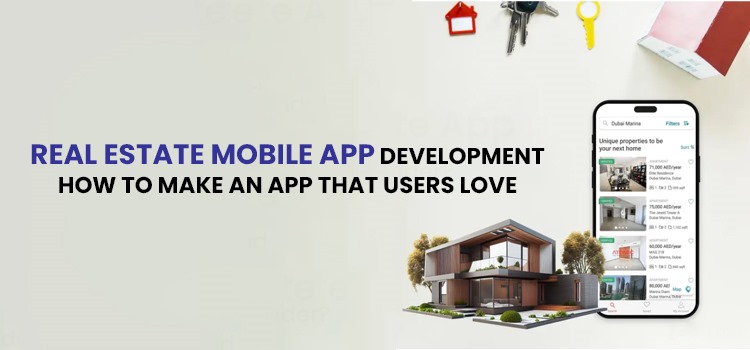
In today’s digital age, the importance of mobile apps in the real estate industry cannot be overstated. Real estate apps have revolutionized how people buy, sell, and rent properties, offering unparalleled convenience and accessibility. But what exactly makes a great real estate app? How do you develop an app that users not only need but love? Let’s dive into the essential steps and strategies for creating a top-notch real estate mobile app.
Understanding User Needs:
To develop an app that truly resonates with users, it’s crucial to understand their needs and preferences. Start by identifying your target audience are they first-time homebuyers, real estate investors, renters, or agents? Each group has unique requirements and expectations from a real estate app.
Common features users look for:
Easy navigation: Users want an app that is simple to use.
Comprehensive listings: Detailed property information including price, location, size, and amenities.
High-quality images: Visual appeal matters significantly in real estate.
Virtual tours: Allows users to explore properties remotely.
Contact options: Easy communication with sellers, agents, or landlords.
Market Research
Before diving into development, conduct thorough market research. Analyze competitors’ apps to identify what works well and what doesn’t. Look for gaps in the market that your app can fill.
Trends in real estate app development:
Increased use of AI and machine learning for personalized recommendations.
Integration of augmented reality (AR) for virtual property tours.
The growing importance of user-generated content like reviews and ratings.
Key Features of a Successful Real Estate App
User-Friendly Interface
Your app interface should be clean, intuitive, and easy to navigate. Users should be able to find what they’re looking for with minimal effort.
Property Listings with Detailed Information
Comprehensive property listings are the backbone of a real estate app. Include high-quality images, videos, and detailed descriptions. Provide information on nearby amenities, school ratings, and neighborhood safety.
Advanced Search and Filter Options
Users appreciate the ability to filter searches based on specific criteria such as price range, property type, number of bedrooms, and more. Advanced search functionality enhances user experience significantly.
Interactive Maps
Integrate interactive maps that allow users to visualize the location of properties and explore the surrounding area. Features like “near me” searches can be very useful.
Virtual Tours
Virtual tours are becoming a must-have feature. They allow users to experience a property without having to visit it in person, saving time and effort.
User Reviews and Ratings
Incorporating a review and rating system builds trust and helps users make informed decisions. It also encourages engagement within the app.
Communication Tools
Ensure your app has robust communication tools such as in-app messaging or direct contact options. This facilitates seamless interaction between buyers, sellers, and agents.
Designing the User Interface (UI)
An intuitive and attractive UI is critical for user retention. Use a consistent color scheme that aligns with your brand. Adopt mobile-first design principles to ensure the app performs well on all devices.
User Experience (UX) Optimization
Smooth navigation and fast loading times are essential. Personalization features like saving searches and receiving notifications about new listings can greatly enhance UX.
Developing the App
When it comes to development, you have several options. Decide whether to build a native app, which is specific to iOS or Android, or a hybrid app that works across multiple platforms. Collaborate closely with developers to ensure your vision is realized.
Backend Development
A strong backend is essential for managing databases, integrating APIs, and ensuring data security. Consider using cloud services for scalability and reliability.
Testing the App
Thorough testing is crucial before launching your app. Conduct beta testing to gather feedback and perform A/B testing to optimize features. Ensure the app is bug-free and performs well under various conditions.
Launching the App
Your app’s launch is a significant event. Employ pre-launch marketing strategies to build anticipation. Optimize your app store listing with relevant keywords, engaging descriptions, and appealing visuals to improve discoverability.
Post-Launch Strategies
After launch, continuously gather user feedback to understand their experiences and pain points. Regular updates and bug fixes are essential to maintain user satisfaction. Adding new features over time can keep the app fresh and engaging.
Monetization Strategies
Consider various monetization strategies such as:
In-app advertising: Display ads relevant to real estate.
Subscription models: Offer premium features for a monthly fee.
Premium features: Charge for advanced search tools, exclusive listings, or ad-free experiences.
Legal Considerations
Ensure your app complies with all relevant real estate regulations. Prioritize user privacy and data protection to build trust and avoid legal issues.
Marketing Your Real Estate App
Effective marketing is key to your app’s success. Use digital marketing strategies like SEO, content marketing, and PPC ads. Promote your app on social media and consider partnerships with real estate influencers to reach a broader audience.
Conclusion
Creating a real estate mobile app that users love involves deeply understanding their needs, meticulous planning, and continuous improvement. By incorporating essential features, optimizing for user experience, and staying updated with market trends, you can develop an app that stands out in the competitive real estate market.
Feel free to get in touch with :
Email: sales@versatileitsol.com
Visit our website: https://www.versatileitsol.com/
Like us on Facebook: https://bit.ly/49DYbjj
Like us on Instagram: https://bit.ly/3TNgn45
21st June,2024.
Subscribe
Subscribe to our blog and never miss our latest updates

Mobile App Development Company Dallas, Texas

Best Mobile App Development Company in UAE

DeepSeek – Everything You Need to Know About This

Why Your Company Website Should Be Responsive

 +91 970 193 0011
+91 970 193 0011 +1 934 221 7261
+1 934 221 7261 +971 55 316 6156
+971 55 316 6156




